School v. School: Arizona State W.P. Carey vs. Arizona Eller
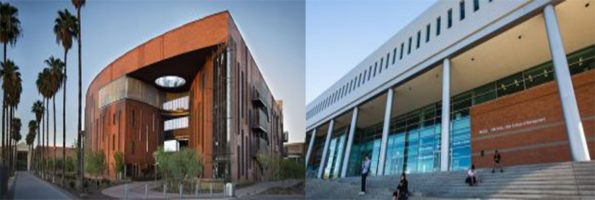
The Grand Canyon State offers two attractive MBA programs tailored to professionals looking to expand their career horizons.
Arizona State University in Tempe, just outside of Phoenix, and the University of Arizona in Tucson, 60 miles from the Mexican border, are both large public universities with renowned business schools. Each program has unique strengths depending on what prospective b-schoolers are ultimately hoping to get out of their business school experience.
We take a look at the two largest business schools in the state of Arizona in our most recent School v. School comparison, analyzing Arizona vs Arizona State.
New Vanderbilt MBA Deadlines Revealed
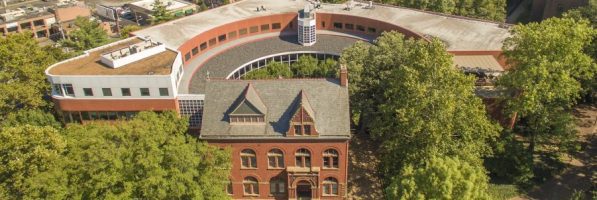
Hopeful applicants to the next full-time MBA class at the Vanderbilt Univeristy Owen Graduate School of Management have some new deadlines to remember.
New Vanderbilt MBA Deadlines
Round One
Application Deadline: Oct. 14, 2019
Interview Decision: Dec. 13, 2019
Decision Release: Jan 17, 2020
Round Two
Application Deadline: Jan 6, 2020
Interview Decision: March 27, 2020
Decision Release: April 20, 2020
Round Three
Application Deadline: April 6, 2020
Interview Decision: April 26, 2020
Decision Release: May 22, 2020
5 Questions with the Senior Director of MBA Admissions at Maryland Smith
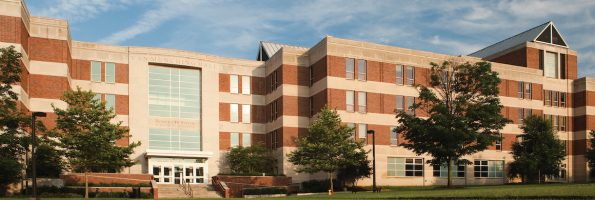
In our latest installment of the MetroMBA “5 Questions” series, we speak with Maria Pineda, the Senior Director of Admissions for the Full-Time MBA Program at the University of Maryland R.H. Smith School of Business. Pineda talks about the ideal MBA candidate, provides advice for getting accepted, and discusses unique opportunities at the school such as the Lead Fearlessly leadership development program.
1. What are you most excited about when it comes to the future of Maryland Smith?
“Smith is becoming a hub for designing the future. Business is becoming more competitive, more complex, more global, and more innovation-driven. Information, data, and technology are driving huge societal changes, often in ways that we can’t anticipate. We are preparing students to lead fearlessly, not just in today’s world, but in the world we can’t even imagine yet.
Smith MBAs learn how to turn data into insights, and insights into action. Our faculty bring their research into the classroom in ways that make even the most complex concepts relevant to managerial decision-making. The curriculum is designed to give students a strong foundation in analytical thinking and business fundamentals, and sharpen and hone leadership skills. With those skills, they’re ready to analyze problems, think creatively, innovate, and then lead a team to execute around a solution. As the economy keeps evolving, our students will be able to adapt.”
2. What does your ideal MBA candidate look like?
“First, we want self-starters, people who will take the initiative to pursue the many unique opportunities for learning and ‘transformation that come with a top MBA program. Our MBA students have a learning mindset. They are self-aware enough to “know what they don’t know’ and are adaptive, flexible and willing to work to grow their analytical skills and leadership competencies. We’re also looking for people who will actively contribute to our diverse, collaborative community, and seek out and consider viewpoints different from their own. We know that those traits—resourcefulness, a learning mindset, and an inclusive attitude—make fearless leaders.”
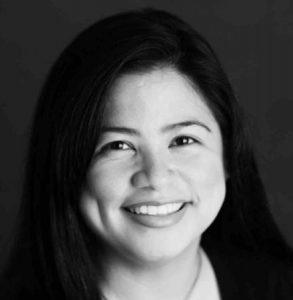
Maria Pineda, Senior Director of Admissions, Full-Time MBA Program
3. What is one thing a Maryland Smith MBA candidate can do for the best chance of getting accepted?
“Take control of your story. It all starts with self-reflection—know what your goals are and what you want to do with your MBA. Present yourself as if it was a job interview. Give us a good overview of your career accomplishments so far, and a thoughtful take on what you hope to accomplish in the future. Be authentic through the process, even as you’re bringing your best self to the table.
And get to know us! Connect with members of the admissions team and interact with current student ambassadors. That will help you see where your career goals align with our program’s distinctives.”
4. What parts of the MBA program should more students know about before starting their graduate school career?
“There are so many opportunities to develop your skills and leadership abilities beyond the classroom that you’ll need to curate your experiences. At Maryland Smith, those include opportunities like the Lead Fearlessly leadership development program, where students sharpen their leadership skills through out-of-the-box experiences like a yacht race on the Chesapeake Bay or small-group sessions with an executive coach. Or students can take on a challenge at the Datathon, part of the Smith Analytics Consortium’s annual conference, which brings together faculty and students with corporate partners. And there are case competitions, club leadership, consulting opportunities, and many more.”
5. Why do you love living and working in Maryland?
“Everyone knows about the many government agencies and NGOs headquartered in Washington DC, just seven miles from campus. But there are also many companies doing exciting work in biotech, defense, and cybersecurity. The job market is always fantastic (people say our local economy is recession-proof).
We have access to the culture, restaurants, and nightlife of a big city, with world-class attractions, a varied, high-quality performing arts scene and every pro sport you can name. We have beautiful outdoor spaces that are accessible from the hundreds of miles of biking and hiking trails around the region, whether you love the ocean or the mountains. And we have a really diverse mix of people that makes for a rich and interesting environment.”
Northeastern’s New MBA Offering, and More – Boston News
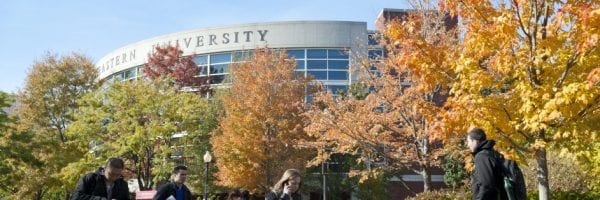
Let’s explore some of the most interesting stories that have emerged from Boston business schools this week.
When Your Moon Shots Don’t Take Off – Harvard Business Review
Many scholars seek to understand how we can move away from incremental thinking to what Google calls “10x thinking”—ideas that lead to “10-fold improvements rather than the more typical 10 percent ones.”
In a recent edition of Harvard Business Review, INSEAD Assistant Professor of Strategy Nathan Furr and Brigham Young’s Jeffrey H. Dyer say the real limit to “10x” ideas are biases that distort our perceptions and prevent us from seeing possibilities.
The duo present tactics and tools to challenge our instincts to avoid risk and choose the path of least resistance with the ultimate goal of breaking through to the realm of innovative possibilities.
Furr and Beesley describe how cell phones, earbuds, credit cards, self-driving cars, and atomic power were all inspired by science fiction. “Science fiction can provide a kind of rigorous optimism. There’s no magic; science fiction just provides the inspiration and then you make a rigorous plan and go for it.”
You can read more about the research over at HBR.
New MBA x Computer Science Degree Addresses Market Demand for Tech-Savvy Leaders – D’Amore-McKim School of Business News
“Breakthrough technologies, robotics, artificial intelligence, the Internet of Things, and blockchain promise higher productivity, enhanced efficiencies, and economic growth,” says Raj Echambadi, Dunton Family Dean at Northeastern University D’Amore-McKim School of Business.
Future business leaders need leadership frameworks but also hard technical skills to have a deeper understanding of how technology will impact the future of business. To meet this growing demand, D’Amore-McKim now offers a new full-time MBA degree concept: MBA x Computer Science.
On the new concentration at Northeastern/D’Amore-McKim, the school writes, “Students in the MBA x Computer Science track will choose one concentration in business and one concentration in computer science thanks to a partnership with Northeastern’s Khoury College of Computer and Information Sciences, and they will also complete a corporate residency–a distinctive component of the Northeastern MBA program that is the hallmark of graduate experiential learning.”
“Business and technology are now intertwined, and to master a skill set in both areas will set our students apart and set them up for success,” says D’Amore-McKim Associate Dean of Graduate Programs Kate Klepper.
Dean Echambadi explains:
“These technologies are changing the way we live, learn, produce, and consume content, as well as how employees and enterprises work across all industries. Advanced business education is a critical component in helping people and industries navigate challenges with digital convergence and turn them into opportunities.”
Read the full D’Amore-McKim School of Business News article here.
Social Media Advertising Can Boost Fake News—Or Beat It – MIT Sloan Ideas Made to Matter
According to new research from MIT Sloan Economist Catherine Tucker and Occidental College’s Lesley Chiou, Ph.D. ’05, restricting or redirecting advertising on social media could be part of a solution to the problem of fake news.
After Facebook released a new advertising system that blocks ads from pages that repeatedly share fake news, researchers found a 75 percent reduction in the amount of fake news being shared on the platform.
Tucker and Chiou caution that the solution is far more complex than just advertising, however.
“The actions of platforms such as Facebook in regulating advertising do seem to have had an effect on the volume of fake news. However, our paper also emphasizes that in just focusing on ads and fake news, we are missing the bigger picture, which is the organic spread of misinformation by users themselves,” Tucker says in a recent interview wit MIT.
“The popularity of fake news may occur in the absence of advertising, as users share articles with others in their social network, but working to stamp out misinformation in those posts runs into its own set of problems,” Tucker adds.
“Trying to regulate that seems to get us into very problematic First Amendment territory.”
You can read more about Tucker and Chiou’s research here.
Georgetown McDonough MBA Admissions Answers 5 Questions
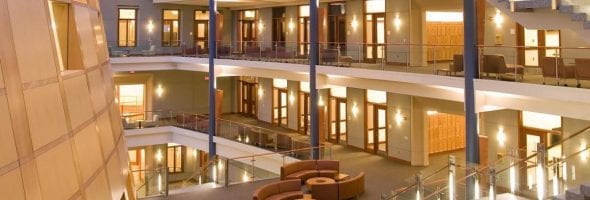
In our latest installment of the MetroMBA “5 Questions” series, we speak with Shelly Heinrich, Associate Dean, MBA Admissions and Director of Marketing at Georgetown University’s McDonough School of Business. She was kind enough to respond to our questions and share insight into what it’s like to attend McDonough for an MBA.
1. How does Georgetown McDonough help MBA students pursue their special interests?
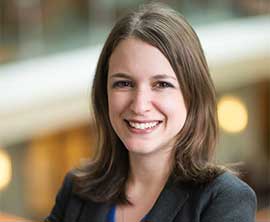
Shelly Heinrich, Associate Dean, MBA Admissions and Director of Marketing
“One of the reasons Georgetown McDonough stands out is because our students have diverse industry interest areas. We are not a school that places half in consulting and half in finance. While these certainly are the largest areas our students pursue, close to 53 percent are seeking careers in the following industries: technology, consumer products, healthcare, hospitality, manufacturing, nonprofit/social impact, real estate, and government. Technology, in particular, is our third highest career placement industry.
Another way students can pursue special interests is with our customizable curriculum. After students in our full-time and Flex MBA complete their core, they can choose from over 100 electives and don’t have to declare a concentration. We believe this is key because every job requires people to wear multiple hats and have multiple skill sets. So, if we were a school that forced students into certain classes, they wouldn’t be able to build a skill set that addresses the multiple knowledge gaps they are seeking to fill.
Additionally, MBA students can leverage the rest of Georgetown University, taking up to 12 credit hours of electives at another Georgetown graduate program or even 6 of those 12 credit hours at partner institutions in the DC metro area.”
2. What makes Georgetown McDonough a special place for you?
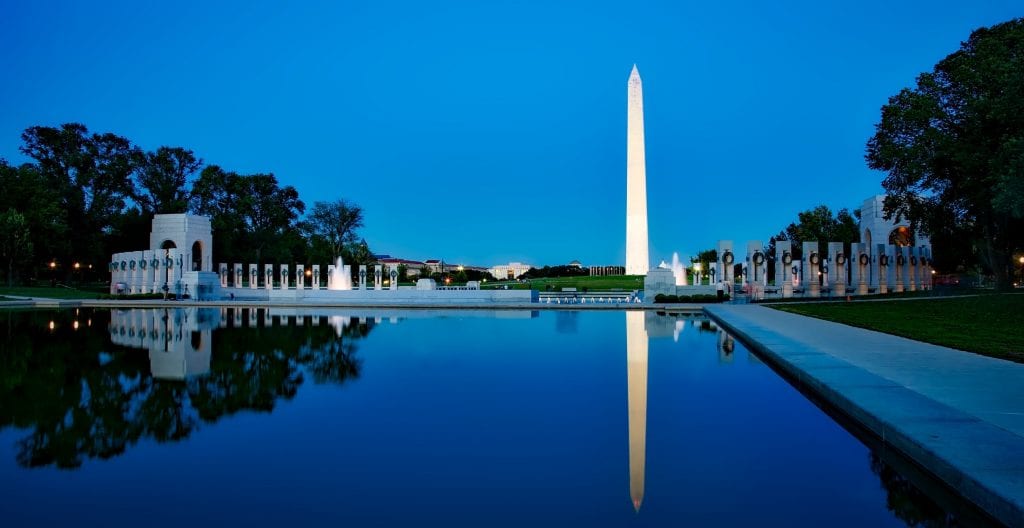
Overlooking the Washington Monument, located just one mile away from the Georgetown University McDonough School of Business campus.
“I experienced what makes Georgetown McDonough special even prior to starting to work here over four years ago. I’ve been living in the DC area for over ten years now and have worked at four other business schools. Throughout my professional and personal life, anytime I engaged with someone who worked, taught, or went to school at Georgetown McDonough, their eyes lit up or ‘sparked’ when talking about their experience. They spoke about their time as if they wanted to be back on campus, reliving their experience. When I received the offer to work here, a former staff member of McDonough reached out to me with congratulations and encouragement and said, ‘I loved my time there. It’s such a special place, and you’re going to love it.’
From day one, I have understood the spark. We have a phenomenal community. Students are high caliber, love their community, and embody the Jesuit values of men and women in service to others. Faculty and staff are committed to the continued growth of the program, and the evidence of this is our continued rise in rankings, the profiles of our incoming students, and our employment results. Also, our alumni are committed to giving back and helping fellow Hoyas.
Four years later, I still love coming to work every day. The buzz and energy of the Hariri building is invigorating and I am always excited to celebrate the weekly or even daily accomplishments of our community.”
3. What does your ideal MBA candidate look like?
“Our ideal candidate has executive presence, grit, diverse personal and professional life experiences, a global mindset, and a generosity of spirit. We want students who will come to Georgetown McDonough and leave a mark, finding their niche in the student community and leaving a legacy that will be experienced by future cohorts and classes.
But, to answer the question that your readers are likely looking for, we certainly look for students with a class profile similar to our recent incoming class. These are students with a strong academic background, professional and personal experiences that can add value to the classroom conversation, and a strong commitment to understanding and appreciating a diverse classroom experience. Our incoming Full-time and Evening MBA class represented over 40 countries and 17 industry backgrounds. The ideal candidate comes in wanting to learn from all the various backgrounds of students.”
4. Are there any new program, centers, faculty members, or events you can talk about?
“The Flex MBA program—the next evolution of our Evening MBA—will start in fall 2019. This program retains the strong assets of our highly ranked part-time MBA program while infusing newly added areas of flexibility.
We will retain an identical curriculum and degree as our full-time MBA and access to the same cohort format. The new aspects of the program include a Saturday elective and hybrid elective options, in addition to the current evening elective offerings. Hybrid electives allow for a mix of on-campus and virtual sessions to provide flexibility to students who may travel for work or who need options to commute less to campus. Additionally, there will be additional opportunities to take our Intensive Learning Experiences, which are 1-2 week intense electives where you complete an entire elective on a host of special topics in a condensed amount of time. Finally, we’re now allowing students to transfer electives of graduate coursework if they have not been counted toward another graduate degree.
We’ve seen strong interest in this program and look forward to the inaugural cohort next fall.
We recently launched a new Certificate in Consumer Analytics and Insights that provides students the opportunity to understand how consumers make decisions via the analysis of consumer data. For students wanting to hone their analytic skills, this is a very relevant certificate. Additionally, the HoyAlytics, student data analytics club is celebrating its one-year anniversary and has provided students with workshops in such programs as Tableau, R, SAS, and Excel.
Working with others across the university, Georgetown McDonough has launched a program to transform the lives of a highly select group of District residents released from local correctional facilities who show strong potential to become successful leaders and role models in their communities.
Through a combination of education and partnership with local employers, the university’s new Pivot Program aims to prepare participants for positions as both entrepreneurial leaders and productive employees.
The Pivot Program represents a collaboration among Georgetown’s Prisons and Justice Initiative, Georgetown College, and the McDonough School of Business, with the support from the Mayor’s Office on Returning Citizen Affairs and a $400,000 grant from the U.S. Department of Commerce’s Minority Business Development agency. In addition, the D.C. Department of Employment Services will provide stipends to our participants.
Georgetown designed the Pivot Program to break that cycle and recapture this untapped human capital. This transition program offers a non-credit-bearing certificate in business and entrepreneurship designed specifically for a cohort of up to 20 returning citizens, to be known as Pivot Fellows.”
5. What’s your favorite DC parade/event that every student should attend?

“I love the Embassy Open House Weekends in May; there are usually two consecutive weekends. Most embassies open their doors for a weekend of food, dancing, and cultural activities specific to their country. You can walk from embassy to embassy for an entire day of cultural immersion. It is something unique to D.C. that you wouldn’t get anywhere in the world. We have over 177 embassies in D.C. which is representative of what a global city we are.
Additionally, every student has to watch the 4th of July fireworks on the National Mall at least once while here. It is truly an U.S. American tradition and patriotic experience. Hot dogs, music, blankets, picnic baskets, and red, white, and blue.”
Northwestern Kellogg & HKUST Lead the 2018 FT EMBA Rankings

Where should you go to school for your Executive MBA? Good question. While, the answer may not be quite so simple, an official EMBA ranking can help.
There are many things you should consider before choosing the best EMBA program for you including average graduation salary, industry employment, research interests, and more. However, a good place to start is with the 18th edition of the Financial Times Global Executive MBA Ranking. This ranking collects key data from business schools and alumni around the world to come up with a list of the top 100 best programs worldwide.
We’ve collated some of the critical data from the ranking study to give you insight into what’s going on in the world of EMBA programs.
EMBA Graduates Choose Industry and Manufacturing
Compared to full-time MBAs, EMBA graduates are much more likely to work in certain industries like manufacturing. In fact, three times as many EMBAs are employed in industry or manufacturing compared to their full-time peers. The figure accounts for 17 percent of all graduates. In comparison, only 10 percent of EMBA graduates are in consulting roles. And they’re less likely to work in finance, too.
EMBAs Earn More Money
EMBA graduates can also expect to earn more money than full-time MBAs after graduation. The average salary for an EMBA is $220,000 whereas an MBA alumnus can expect to make $146,000. It’s a large gap that’s similar to the salary gap between an MBA and a MiM graduate ($146,000 VS $67,000). Keep in mind, however, that the typical Executive MBA student is significantly older and often has more work experience.
In contrast, full-time MBAs win when it comes to salary boosts before and after earning the degree. MBA alumni generally increase their salary by 107 percent while EMBAs only experience a 59 percent boost.
Top 10 EMBA Programs
This year, the top ten EMBA programs, according to the Financial TImes, includes four joint programs. In fact, these were the top four programs in the world ranking well for post-EMBA salary, alumni leadership positions, and work experience. Each of these programs offer excellent networking opportunities thanks to different cohorts across different campuses, connecting students around the world.
Here’s how all the rankings stacked up.
1. Northwestern Kellogg & HKUST
This joint program ranks first for the third year in a row, and it’s the ninth time in 12 years that it has headed the list—the other three times it ranked second. The program is known for having the highest average salary three years post-graduation, $507,000—$140,000 more than the second-highest salary. It’s also known for having half of its alumni as company leaders three years post-graduation.
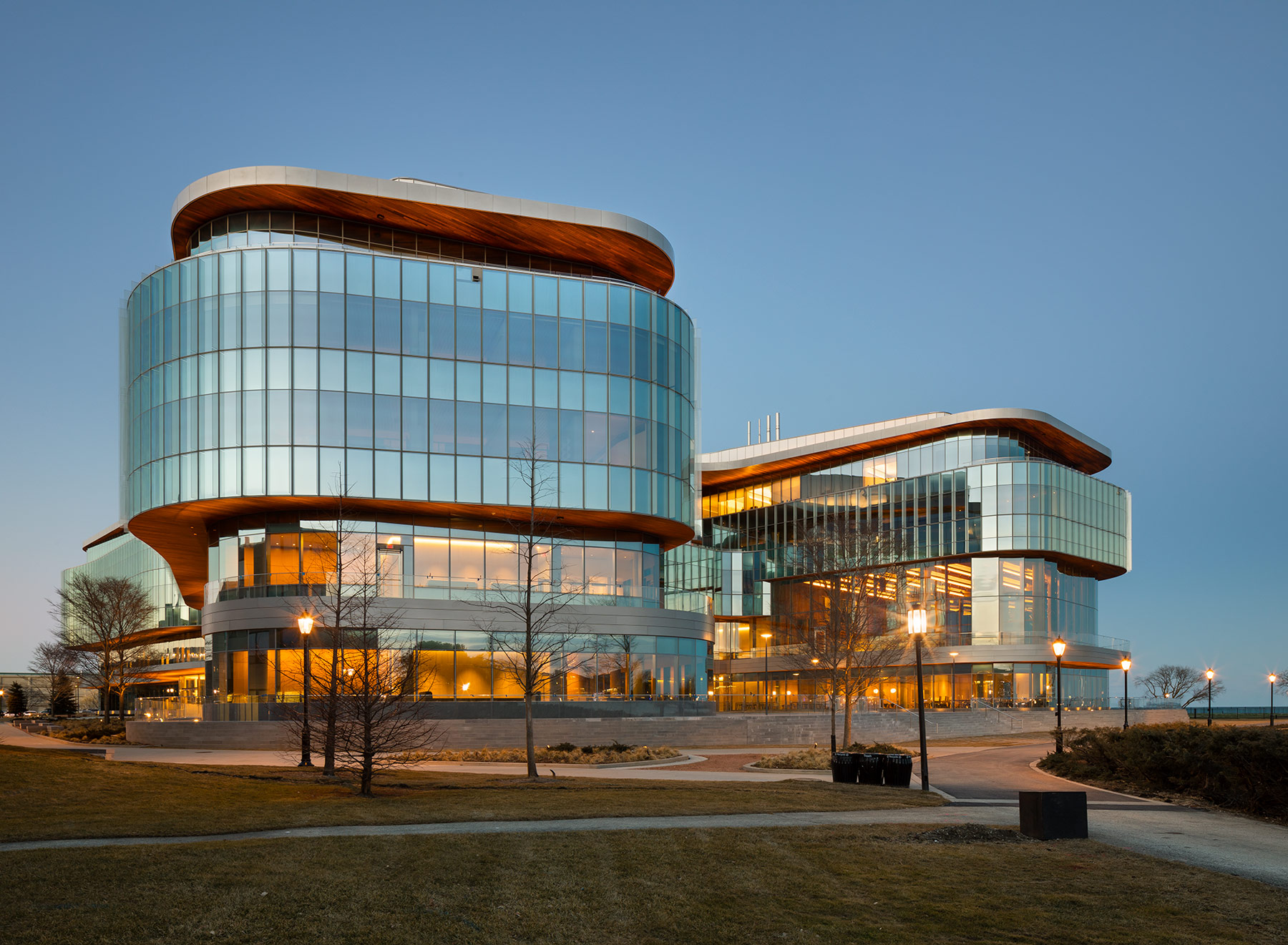
No EMBA has dominated the annual FT ranking quite like the Northwestern Kellogg & HKUST join program, earning top billing once again for 2018.
2. HEC Paris, LSE, & NYU Stern
This trium global EMBA program ranks second in 2018, up from fifth the previous year. The program is ranked first in work experience, languages, and international course experience rank. It also ranks highly in average salary ($347,970) with an expected 60 percent salary increase three years post-EMBA.
3. Tsinghua University & INSEAD
For the second year in a row, the Tsinghua-INSEAD dual degree MBA comes in third overall on the FT EMBA ranking. Located in China, Singapore, France, and the UAE, the program is known for its high salary three years post graduation ($365,746), and its high percentage of female students (45 percent).
The rest of the top ten shakes down as follows:
- EMBA—Global Asia: Columbia Business School, HKU, & London Business School
- Ceibs
- HEC Paris
- Washington University Olin Business School
- Shanghai: Jiao Tong University Antai
- IESE Business School
- MIT Sloan School of Management
Surprising Schools
There were quite a few surprises in this year’s EMBA ranking.
- Though HEC Paris has ranked in the top five since 2006 because of its joint program with NYU Stern and LSE, this was the first year the school entered the top ten ranking on its own. The HEC Paris solo EMBA program ranks sixth overall, making it the highest new entrant.
- IESE Business School took home the crown as the top EMBA program for the new criterion corporate social responsibility (CSR).
- The University of Toronto Rotman School of Management EMBA moved up the most places in 2018, rising to 47th place overall—20 places higher.

No school saw a bigger rankings jump than the University of Toronto Rotman School of Management, rising 20 spots in 2018.
FT EMBA Ranking Methodology
To come up with the 2018 EMBA ranking, the Financial Times reached out to a record 139 programs with two online surveys: the first completed by the school and the second by alumni who graduated from programs in 2014. The methodology of the ranking is as follows:
- Alumni were required to provide feedback on salary today, salary increase, career progress, work experience, and aims achieved—accounting for 55 percent of the ranking’s weight.
- Schools provided insight into ten criteria, accounting for 35 percent of the total ranking. Criteria included: gender and international diversity, board members, international program reach, and more.
- Accounting for the final 10 percent of the ranking was the FT research rank, which looks at the number of articles published by a school’s full-time faculty.
And, for the first time ever, this year’s EMBA ranking included a new criterion for corporate social responsibility (CSR). This new criterion took a look at how many of a school’s core courses were dedicated to ethics, social, and environmental issues. Weighting at 3 percent, this criteria replaced the number of Ph.D. graduates per school.
